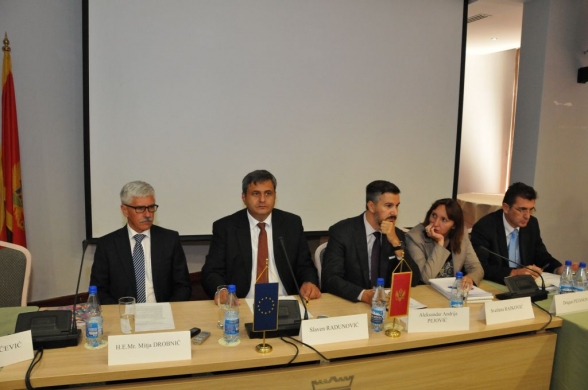Following the debate relating to the Negotiation Chapter 10 – Information Society and Media, the Committee on European Integration organised a second public debate on the topic “Montenegro and the European Union – Negotiation Chapters 23 and 24”. The panellists of the public debate, moderated by the Chairperson of the Committee on European Integration Mr Slaven Radunović, included the following: Head of the EU Delegation Mr Mitja Drobnič, Head Negotiator Mr Aleksandar Andrija Pejović, member of the Negotiation Group Ms Svetlana Rajković, as well as the heads of the working groups for chapters 23 and 24 Ms Branka Lakočević and Mr Dragan Pejanović.
The panellists pointed out the new approach of the EU and member states regarding the accession process, relating to the fact that the chapters dedicated to judiciary, fundamental rights, justice, freedom and security, would remain open, both for Montenegro and other candidate countries, during the course of the negotiation process. Having in mind its complexity, therein precisely lies the significance of these chapters, which, during previous enlargements, represented the main challenge for the candidate countries. In part of the debate on the role of the Parliament of Montenegro, apart from the fundamental legislative function regarding adoption of laws, the thing especially pointed out in the debate was the importance of promotion of the oversight role in part of monitoring of implementation of the acquired acquis, but also the commitments in which the Parliament was marked as the carrier of activities, through the action plan.
During the discussion in the debate, the representatives of the civil sector as well as some MPs expressed concern regarding deadlines for implementation of measures of the action plan. However, the negotiating team sent assurances that the Working Group which had worked on drafting of the action plans had tried to make the said deadlines realistic, and therefore attainable. In addition, it was pointed out that the existence of political will for adoption and implementation of legislation was needed in order to reach the standard, which in the end would be the key criterion for opening and closing of negotiation chapters.
Apart from the members of the Committee on European Integration, the debate was also attended by the representatives of the Committee on Security and Defence, Committee on Political System, Judiciary and Legislation, Anti-Corruption Committee, and the Committee on Human Rights and Freedoms, Secretary General of the Parliament, and the representatives of OSCE Mission, UNDP, NGOs and media.









